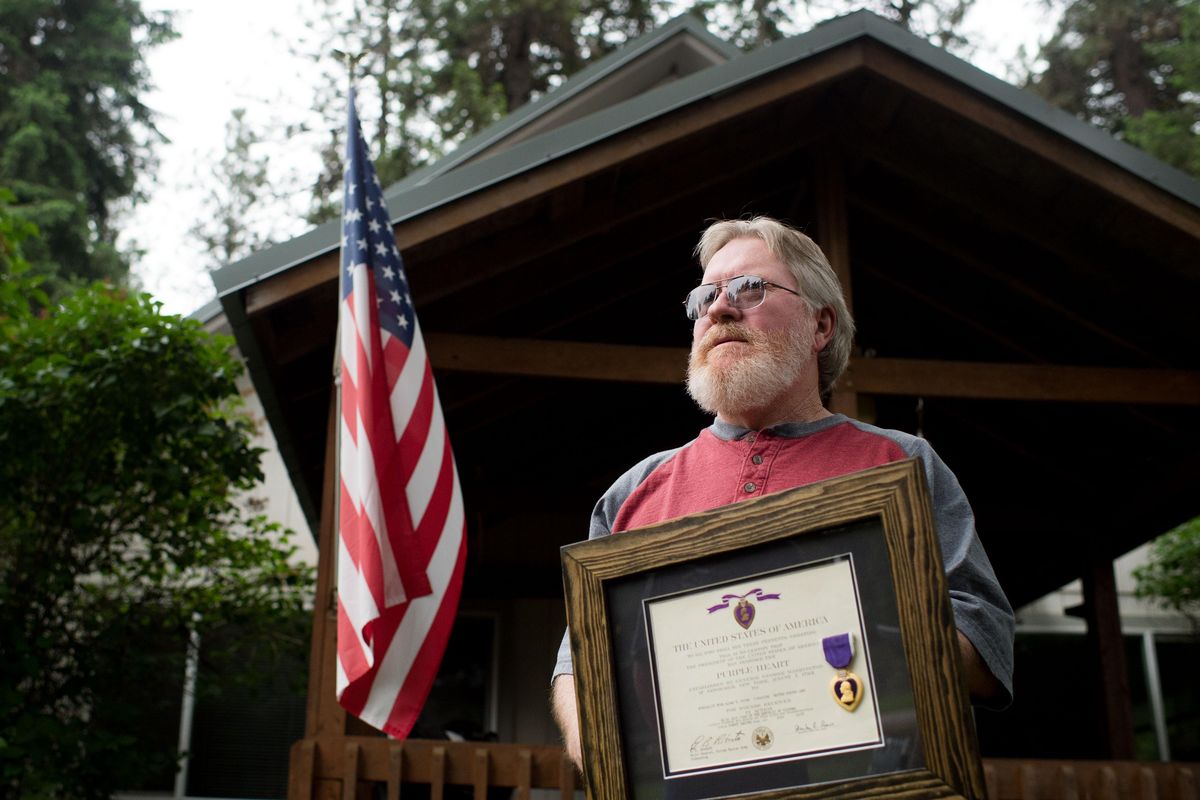Purple Heart returns to Vietnam veteran after five decades

NEWPORT, Wash. – Allen Pough remembers the day vividly.
He could hardly see anything as he cut his way through thick, green foliage with a machete along the Ho Chi Minh trail. And then it happened: His 1st Cavalry Division unit was ambushed by the enemy.
He felt a piece of shrapnel from a B-40 rocket-propelled grenade sink into his arm, but he noticed a man from another unit was in worse shape, with a piece of shrapnel stuck in his chest.
Pough helped walk the man to the medevac, a helicopter ambulance. It was just what you did when someone got hurt, he said. You helped them. The two sat in the helicopter with four other men, smoking cigarettes and chatting after getting bandaged.
Pough was fine, but the other man didn’t make it.
As they sat and talked, the man suddenly fell to the floor and died.
Pough didn’t want the Purple Heart he earned that day for what had happened.
When he exited the airplane back in the United States, war protesters jeered and called him names, he said. He felt automatic judgment come from people for having short hair, a giveaway that he had served in the war during a time when long hair was in style for men.
Pough’s mother had wanted to take a picture of him in his uniform when he moved back to his hometown in Boise. He refused.
“I’m not proud of that,” he told her, shaking his head.
He didn’t care what became of his Purple Heart and other awards. He let his mother hang on to his service items. But shortly after he returned, he dug out his Purple Heart for a job application. He was applying to work for the U.S. Postal Service, and being a veteran and having a Purple Heart increased his chances of getting the job by 20 percent.
His high school friend, Kent Bickle, had also served in Vietnam. Bickle’s mother worked at the post office in Boise, and he and Pough both applied for jobs. Pough didn’t get the job, and he never bothered to retrieve the Purple Heart that was left with Bickle.
The friends fell out of touch as they both moved on in life. Bickle stayed in Caldwell, Idaho, just outside of Boise, and Pough now lives in Newport. Pough didn’t think much about his lost Purple Heart, and didn’t think he would see it again. But in a roundabout, fluky way, the award has finally found its way back into his possession after nearly 50 years.
Pough’s high school friends were instrumental in getting the Purple Heart back to him. Through essentially playing a game of telephone, Bickle, Don Thompson and Claudia Smith were able to finally get the award back in Pough’s hands.
Pough and Thompson reconnected a couple of years ago, and they have since reminisced over younger, more carefree years.
Thompson remembers cruising around Boise with friends in Pough’s old blue ’56 Chevy Bel Air the summer after their senior year of high school. They didn’t have machine guns, attacks and shrapnel to worry about. That time was cut short, though, when Pough enlisted in the Army later that fall.
Pough started out as a point man, so he was the leader of the group as they marched down the Ho Chi Minh trail. The forest was so thick he often couldn’t see his own hand in front of his face. He just had to cut down whatever was in front of him.
He later served as a machine gunner and unit leader. His time on the trail was tough. He said there were times when he wished he would get shot in the leg so he wouldn’t have to be a foot soldier.
Point man is the most high-risk position. There were times when Pough would rotate out of being in front, and the new point guard would get shot.
“He’s really lucky to be here,” said Thompson, who collected the Purple Heart from Bickle after he reconnected with Pough. He said Bickle was happy to get the Purple Heart back in Pough’s hands.
After Vietnam, home felt foreign to Pough. It still does. He said he told a support group at his local Veterans Center that all his friends had changed once he got back. They all laughed. It wasn’t his friends who had changed. He did.
He said he still doesn’t really feel like he has fully transitioned back into society. But as attitudes toward Vietnam vets have shifted, he’s come to value his Purple Heart and what it stands for. He was happy to have it back.
“They earned it the hard way,” Thompson said.